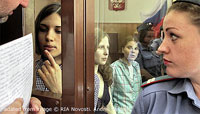Former Kremlin Strategist Sees Pussy Riot Poll As Evidence Of Split In Society
Recent polling suggesting that Russian public opinion is sharply divided over the outcome of the Pussy Riot trial may reflect a more fundamental split in society, a former Kremlin strategist told the Interfax news agency on 30 August.

file photoAn opinion poll published earlier in the day by the state-run All-Russian Public Opinion Research Centre suggests that 33 per cent of Russians believe the two-year sentence recently handed down to three members of the feminist punk band for their anti-Putin protest in February was too harsh, 31 per cent feel the punishment was justified, 15 per cent believe it is too lenient and 10 per cent think the three women should not have been sentenced at all. Gleb Pavlovskiy, a Kremlin adviser for many years before being let go in 2011, told Interfax that the poll numbers were worrying.
"This suggests a split. The split is deep, and, in itself, I believe that it is not political in origin, but it is turning into a serious and very dangerous political factor... The danger is that the split, as a factor in politics, is starting to be viewed as a pretext for an additional split, which, in turn, could become religious and ideological," he said.
"If this becomes a tradition in Russia, then we may end up with people voting not politically, but on the basis of religious identity. In the Russian environment, where there are different regions and religions, this is a dangerous trend and poses a threat to the country's unity," he added.
Keywords: Russia, Government, Politics - Russia, Religion - Russia, Law, Crime - Russian News - Russia - Johnson's Russia List
Recent polling suggesting that Russian public opinion is sharply divided over the outcome of the Pussy Riot trial may reflect a more fundamental split in society, a former Kremlin strategist told the Interfax news agency on 30 August.

file photoAn opinion poll published earlier in the day by the state-run All-Russian Public Opinion Research Centre suggests that 33 per cent of Russians believe the two-year sentence recently handed down to three members of the feminist punk band for their anti-Putin protest in February was too harsh, 31 per cent feel the punishment was justified, 15 per cent believe it is too lenient and 10 per cent think the three women should not have been sentenced at all. Gleb Pavlovskiy, a Kremlin adviser for many years before being let go in 2011, told Interfax that the poll numbers were worrying.
"This suggests a split. The split is deep, and, in itself, I believe that it is not political in origin, but it is turning into a serious and very dangerous political factor... The danger is that the split, as a factor in politics, is starting to be viewed as a pretext for an additional split, which, in turn, could become religious and ideological," he said.
"If this becomes a tradition in Russia, then we may end up with people voting not politically, but on the basis of religious identity. In the Russian environment, where there are different regions and religions, this is a dangerous trend and poses a threat to the country's unity," he added.